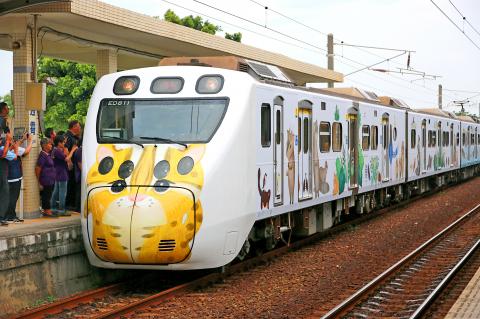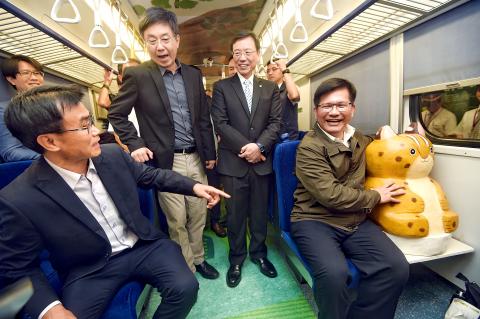A new Taiwan Railways Administration (TRA) train designed to promote ecological conservation was launched yesterday morning at Nangang Railway Station in Taipei.
The second Satoyama Animal Train (里山動物列車) is twice as long as the first, which ran last year as part of a partnership with the Forestry Bureau.
The trains have been named after the Satoyama Initiative, which promotes conservation and sustainable use to preserve biodiversity. Satoyama is a Japanese term that means the area between mountains and arable land.

Photo: Cheng Ming-hsiang, Taipei Times
Given the positive feedback on last year’s train, Minister of Transportation and Communications Lin Chia-lung (林佳龍) asked the TRA to work with the bureau to create a new animal-themed train for this year, the TRA said.
The locomotives for the new train feature either a leopard cat or a ring-neck pheasant, while the doors and the ceilings of the eight passenger cars are decorated with animals from the nation’s four ecosystems: secondary forests, rivers and creeks, wetlands and rice paddies, and rural fields and villages, it said.
Each car has an LCD monitor that will show videos about Taiwan’s wildlife, such as crested honey buzzards and crab-eating mongooses, the agency said.

Photo: Fang Pin-chao, Taipei Times
However, the second car of the train is different from the others, as it is a natural ecosystem itself, with the floor painted with rice paddies, while figurines in the form of leopard cats, African grass owls and other woodland creatures are on the seats, and “birds” perch on the straphanger rails, the agency said.
The exterior of the new train is painted with creatures such as Pancala snails, Chinese striped-necked turtles and woodpeckers, the TRA said.
Fifty-five protected wildlife species inhabit the environment below 1,000m above sea level, and their habitats have become fragmented because of human activity, Forestry Bureau Director Lin Hwa-ching (林華慶) said.
The train was designed to express the hope that animals could freely move around in their habitats, he said.
TRA Director-General Chang Cheng-yuan (張政源) said the agency would soon launch trains featuring Taiwanese Aborigine pictures and motifs, as well as tourist attractions along the Highway No. 3.
Following yesterday’s short pilot run, the new Satoyama Animal Train officially becomes part of the TRA’s commuter train fleet today.
It will be used on services between the Keelung and Chiayi stations, and between the Houli and Chaozhou stations, the agency said.

CHAMPIONS: President Lai congratulated the players’ outstanding performance, cheering them for marking a new milestone in the nation’s baseball history Taiwan on Sunday won their first Little League Baseball World Series (LLBWS) title in 29 years, as Taipei’s Dong Yuan Elementary School defeated a team from Las Vegas 7-0 in the championship game in South Williamsport, Pennsylvania. It was Taiwan’s first championship in the annual tournament since 1996, ending a nearly three-decade drought. “It has been a very long time ... and we finally made it,” Taiwan manager Lai Min-nan (賴敏男) said after the game. Lai said he last managed a Dong Yuan team in at the South Williamsport in 2015, when they were eliminated after four games. “There is

Chinese Nationalist Party (KMT) lawmakers have declared they survived recall votes to remove them from office today, although official results are still pending as the vote counting continues. Although final tallies from the Central Election Commission (CEC) are still pending, preliminary results indicate that the recall campaigns against all seven KMT lawmakers have fallen short. As of 6:10 pm, Taichung Legislators Yen Kuan-heng (顏寬恒) and Yang Chiung-ying (楊瓊瓔), Hsinchu County Legislator Lin Szu-ming (林思銘), Nantou County Legislator Ma Wen-chun (馬文君) and New Taipei City Legislator Lo Ming-tsai (羅明才) had all announced they

Nvidia Corp CEO Jensen Huang (黃仁勳) yesterday visited Taiwan Semiconductor Manufacturing Co (TSMC, 台積電), as the chipmaker prepares for volume production of Nvidia’s next-generation artificial intelligence (AI) chips. It was Huang’s third trip to Taiwan this year, indicating that Nvidia’s supply chain is deeply connected to Taiwan. Its partners also include packager Siliconware Precision Industries Co (矽品精密) and server makers Hon Hai Precision Industry Co (鴻海精密) and Quanta Computer Inc (廣達). “My main purpose is to visit TSMC,” Huang said yesterday. “As you know, we have next-generation architecture called Rubin. Rubin is very advanced. We have now taped out six brand new

POWER PLANT POLL: The TPP said the number of ‘yes’ votes showed that the energy policy should be corrected, and the KMT said the result was a win for the people’s voice The government does not rule out advanced nuclear energy generation if it meets the government’s three prerequisites, President William Lai (賴清德) said last night after the number of votes in favor of restarting a nuclear power plant outnumbered the “no” votes in a referendum yesterday. The referendum failed to pass, despite getting more “yes” votes, as the Referendum Act (公民投票法) states that the vote would only pass if the votes in favor account for more than one-fourth of the total number of eligible voters and outnumber the opposing votes. Yesterday’s referendum question was: “Do you agree that the Ma-anshan Nuclear Power Plant